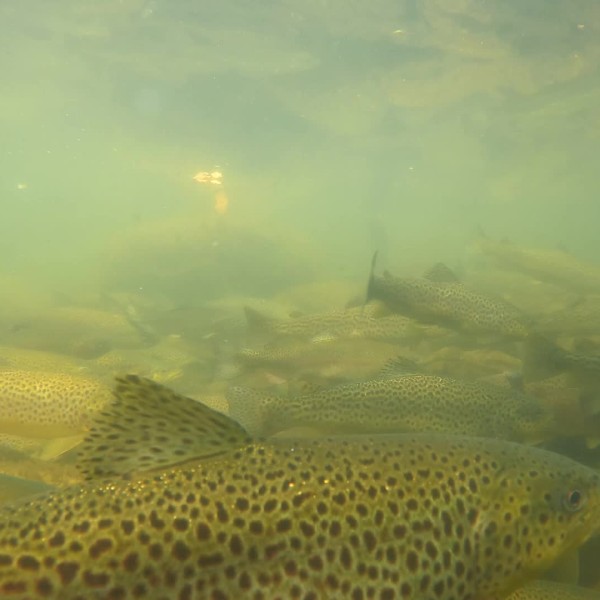This summer, seven Master’s program students from Paul Smith’s College completed graduate research projects in collaboration with CBFS Shackelton Point. The students designed, executed, and reported on their projects over a year-long period, focusing on a broad range of topics including invasive species, fish populations, outreach, and forestry.
Several of these projects were made possible by extensive long-term datasets collected by CBFS over the decades. These long-term datasets make it possible for researchers to examine broad changes in the Oneida Lake ecosystem due to invasive species introductions, climate change, and changes in the fish community over many years.
Brian Hiner examined the impact of climate change on ice fishing on Oneida Lake. He used angler interview data collected by CBFS staff to analyze the changes in yellow perch and walleye catch and angler behavior in good and bad ice years. He found that while catch rates are impacted more by in-lake fish population dynamics than ice conditions, the number of ice anglers declined in bad ice years which may have a significant impact on tourism in the future.
Ethan Billman created an updated version of the Oneida Lake Profile, an informational pamphlet that shares the history and ecology of Oneida Lake and updates the public on research happening at CBFS. In addition to revising the print version, he created an online version to bring this free resource to a wider audience.
Garrett Manchester surveyed angler attitudes toward double-crested cormorants on Oneida Lake. While he found that angler opinions of the birds were overwhelmingly negative, attitudes were significantly influenced by the angler’s perception of the species as native, invasive, or a nuisance species.
Mackenzie Benoit used a decades-long dataset on fish populations to examine environmental drivers of freshwater drum recruitment in Oneida Lake. She found that wind speed and direction in the spring, when larval drum are still very small, significantly influenced year class strength.
Michael Geiler, a high school teacher in Tennessee, created new materials and lesson plans for CBFS’s Big Red Box school outreach program. The program brings Oneida Lake into the classroom by providing teachers with biological samples, handouts, and other resources to help incorporate lake science into their curriculum. Michael is originally from the Syracuse area and earned his degree from SUNY Geneseo.
Tim Murphy used another CBFS long-term dataset on invasive zebra mussels, quagga mussels, and round gobies to examine how these three invasive species interact with each other. He found that the introduction of round gobies, which prey on zebra mussels, led to a significant decrease in mussel shell length in Oneida Lake.
Will Mashburn surveyed the extensive forest on CBFS’s property and established a network of long-term monitoring plots to be used in future research projects. He found that the forest has been heavily impacted by invasive emerald ash borer, which has led to the loss of 33% of the forest’s canopy.
These graduate students, along with the rest of the Paul Smith’s College graduate cohort, presented their final projects on the PSC campus in the Adirondacks on June 24th, 2023. CBFS director Lars Rudstam was in attendance.
Dr. Ellen George, the professor at Paul Smith’s College who supervised the projects, earned her Ph.D. in Natural Resources from Cornell in 2019 and is happy to be continuing to collaborate with the folks at CBFS. She is grateful to Lars Rudstam, Tony VanDeValk, Tom Brooking, and the rest of the CBFS team for helping make these projects a success.





